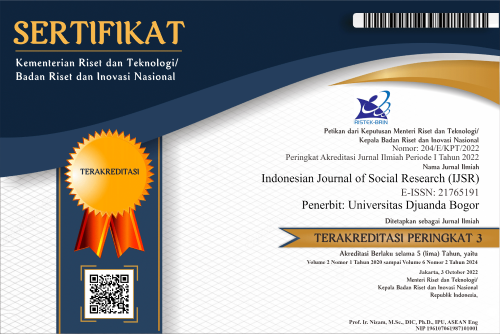Analyzing The Relationship Between Job Satisfaction and Turnover Intentions Among Hospitality Employees in Cape Coast
Abstract
The hospitality industry has gained much attention following its enormous contributions to economies. The job satisfaction of employees has been remarked to lead to higher productivity in the hospitality industry. This study explored the effects of employees' job satisfaction and their intention to quit. Through a quantitative research approach using regression models and descriptive statistics, the study analyzed 40 questionnaire responses from employees. The analyses revealed a significant negative relationship between job satisfaction and the turnover intention of employees. The results showed that the socio-demographics of respondents are relevant to their job happiness. It was revealed that employees had fair satisfaction with their jobs, although promotion and work conditions barely influenced their satisfaction. Based on these findings, the study recommended further practice and research.
References
Akova, O., Cetin, G., & Cifci, I. (2015). The Relation between Demographic Factors and the Turnover Intention in Pre-opening Hotel Businesses. Procedia - Social and Behavioral Sciences, 207, 377–384. https://doi.org/10.1016/j.sbspro.2015.10.177
Alshamey, O. A. (2019). Factors That Affect Motivation and Job Satisfaction of Employees Within Hospitality Industry.
Amissah, E. F., Gamor, E., Deri, M. N., & Amissah, A. (2016). Factors influencing employee job satisfaction in Ghana’s hotel industry. Journal of Human Resources in Hospitality & Tourism, 15(2), 166–183. https://doi.org/10.1080/15332845.2016.1084858
Appiah, J. K. (2019). Community-based corporate social responsibility activities and employee job satisfaction in the US hotel industry: An explanatory study. Journal of Hospitality and Tourism Management, 38, 140–148. https://doi.org/10.1016/j.jhtm.2019.01.002
Asnawi, A., & Sulaiman, S. (2021). The Role of Job Satisfaction in Mediating Self-Efficacy and Income Levels on Employee Performance at Aceh Reintegration Agency Secretariat. International Journal of Advance Study and Research Work, 4(5), 25-35.
Aon, H. (2020). The Latest Trends in Global Employee Engagement. Available online: https://www.aon.com/attachments/thoughtleadership/Trends_Global_Employee_Engagement_Final.pdf (accessed on 2nd July 2021).
Chan, S. H. J., & Ao, C. T. D. (2019). The mediating effects of job satisfaction and organizational commitment on turnover intention, in the relationships between pay satisfaction and work–family conflict of casino employees. Journal of Quality Assurance in Hospitality & Tourism, 20(2), 206–229. https://doi.org/10.1080/1528008x.2018.1512937.
Chang, W., & Tanford, S. (2018). The impact of job advertising on hospitality graduates’ job pursuit intention. Journal of Hospitality & Tourism Education, 30(4), 215–228. https://doi.org/10.1080/10963758.2018.1480380.
Chen, H., & Qi, R. (2022). Restaurant frontline employees’ turnover intentions: three-way interactions between job stress, fear of COVID-19, and resilience. International Journal of Contemporary Hospitality Management, 34(7), 2535-2558. https://doi.org/10.1108/ijchm-08-2021-1016.
Creswell, J. W. (2009). Research design: Qualitative, quantitative, and mixed methods approaches (3rd ed). Sage Publications.
Cropanzano, R., Rupp, D. E., Mohler, C. J., & Schminke, M. (2001). Three roads to organizational justice. In research in personnel and human resources management (pp. 1–113). Emerald Group Publishing Limited. https://doi.org/10.1016/s0742-7301(01)20001-2.
Daud, N. (2016). Determinants of job satisfaction: How satisfied are the new generation employees in Malaysia? Procedia-Social and Behavioral Sciences, 219, 208–213. https://doi.org/10.1016/j.sbspro.2016.05.007
Farrukh, M., Kalimuthu, R., Farrukh, S., & Khan, M. S. (2020). Role of job satisfaction and organizational commitment in employee loyalty: Empirical analysis from Saudi hotel industry. Int. J. Bus. Psychol, 2, 1–20.
Field, A. (2013). Discovering statistics using IBM SPSS statistics. sage.
Funmilola, O. F., Sola, K. T., & Olusola, A. G. (2013). Impact of job satisfaction dimensions on job performance in a small and medium enterprise in Ibadan, South Western, Nigeria. Interdisciplinary journal of contemporary research in business, 4(11), 509-521.
George, E., & KA, Z. (2015). Job related stress and job satisfaction: A comparative study among bank employees. Journal of Management Development, 34(3), 316–329. https://doi.org/10.1108/jmd-07-2013-0097.
Gopinath, R. (2016). Is the Employee Health and Safety related to Job Satisfaction? An inquiry into BSNL Employees with special reference in three different SSAs using Modeling. IOSR Journal of Business and Management, 18(7), 135–139.
Gopinath, R. (2020). An investigation of the relationship between self-actualization and job satisfaction of academic leaders. International Journal of Management (IJM), 11(8), 753–763.
Gorenak, M., Edelheim, J. R., & Brumen, B. (2020). The influence of organizational values on job satisfaction of employees. Human Systems Management, 39(3), 329–343. https://doi.org/10.3233/hsm-190781
Hackman, J. R., & Oldham, G. R. (1976). Motivation through the design of work: Test of a theory. Organizational Behavior and Human Performance, 16(2), 250–279. https://doi.org/10.1016/0030-5073(76)90016-7
Huang, Y.-H., Lee, J., McFadden, A. C., Murphy, L. A., Robertson, M. M., Cheung, J. H., & Zohar, D. (2016). Beyond safety outcomes: An investigation of the impact of safety climate on job satisfaction, employee engagement and turnover using social exchange theory as the theoretical framework. Applied Ergonomics, 55, 248–257. https://doi.org/10.1016/j.apergo.2015.10.007
Issa, D. A. R. M., Ahmad, F., & Gelaidan, H. M. (2013). Job satisfaction and turnover intention based on sales person standpoint. Middle-East Journal of Scientific Research, 14(4), 525-531.
Jeong, M., & Oh, H. (2017). Business-to-business social exchange relationship beyond trust and commitment. International Journal of Hospitality Management, 65, 115–124. https://doi.org/10.1016/j.ijhm.2017.06.004
Karatepe, O. M. (2016). Does job embeddedness mediate the effects of co-worker and family support on creative performance? An empirical study in the hotel industry. Journal of Human Resources in Hospitality & Tourism, 15(2), 119–132. https://doi.org/10.1080/15332845.2016.1084852
Kataria, A., Garg, P., & Rastogi, R. (2013). Does psychological climate augment OCBs? The mediating role of work engagement. The Psychologist-Manager Journal, 16(4), 217. https://doi.org/10.1037/mgr0000007
Kim, H., & Chung, Y. W. (2014). The Use of Social Networking Services and Their Relationship with the Big Five Personality Model and Job Satisfaction in Korea. Cyberpsychology, Behavior, and Social Networking, 17(10), 658–663. https://doi.org/10.1089/cyber.2014.0109
Lee, S., & Ravichandran, S. (2019). Impact of employees’ job control perceptions on their work-related responses in the hospitality industry. International Journal of Contemporary Hospitality Management, 31(7), 2720–2738. https://doi.org/10.1108/ijchm-09-2018-0784
Li, R., & Yao, M. (2022). What promotes teachers’ turnover intention? Evidence from a meta-analysis. Educational Research Review, 100477. https://doi.org/10.1016/j.edurev.2022.100477
Martin, J. (2020). Job satisfaction of professional librarians and library staff. Journal of Library Administration, 60(4), 365–382. https://doi.org/10.1080/01930826.2020.1721941
Masum, A. K. M., Azad, M. A. K., Hoque, K. E., Beh, L.-S., Wanke, P., & Arslan, Ö. (2016). Job satisfaction and intention to quit: An empirical analysis of nurses in Turkey. PeerJ, 4, e1896. https://doi.org/10.7717/peerj.1896
Mendis, M. V. S. (2017). The Impact Of Reward System On Employee Turnover Intention: A Study On Logistics Industry Of Sri Lanka. 6(09).
Mendoza, E. C. (2019). The mediating role of job involvement between job satisfaction and organizational commitment in a small and medium sized business enterprise. International Review of Management and Marketing, 9(5), 74. https://doi.org/10.32479/irmm.8355
Mete, E. S., & Sökmen, A. (2017). Exploring the relationship between job satisfaction and turnover intention among employees in hospitality industry: the moderating role of gender. International Review of Management and Business Research, 6(3), 1287-1298.
Mishra, P. K. (2013). Job Satisfaction. OSR Journal Of Humanities And Social Science, 14(5), 44–54. https://doi.org/10.9790/1959-1454554
Mulang, H. (2022). Analysis of The Effect of Organizational Justice, Worklife Balance on Employee Engagement and Turnover Intention. Golden Ratio of Human Resource Management, 2(2), 86–97. https://doi.org/10.52970/grhrm.v2i2.169
Ngatuni, P., & Matolo, A. (2018). The effects of job satisfaction on employees’ turnover intention in commercial banks in Tanzania. Faculty of Business Management The Open University of Tanzania, 55.
Ngo, H., Loi, R., Foley, S., Zheng, X., & Zhang, L. (2013). Perceptions of organizational context and job attitudes: The mediating effect of organizational identification. Asia Pacific Journal of Management, 30, 149–168. https://doi.org/10.1007/s10490-012-9289-5
Nica, E. (2016). Employee voluntary turnover as a negative indicator of organizational effectiveness. Psychosociological Issues in Human Resource Management, 4(2), 220–226. https://doi.org/10.22381/pihrm4220169
Norbu, J., & Wetprasit, P. (2021). The study of job motivational factors and its influence on job satisfaction for hotel employees of Thimphu, Bhutan. Journal of Quality Assurance in Hospitality & Tourism, 22(2), 245–266. https://doi.org/10.1080/1528008x.2020.1769524
Phuong, T. T. K., & Tran, T. V. (2020). Job satisfaction, employee loyalty and job performance in the hospitality industry: A moderated model. Asian Economic and Financial Review, 10(6), 698. https://doi.org/10.18488/journal.aefr.2020.106.698.713
Pradhan, S. (2022). Work stressors and job outcomes: An empirical investigation of frontline service employees in the Indian hospitality industry. 10(1), 35–52. https://doi.org/10.1108/ebhrm-11-2020-0143
Rahman, M. M., & Iqbal, M. F. (2013). A comprehensive relationship between job satisfaction and turnover intention of private commercial bank employees’ in Bangladesh. International Journal of Science and Research, 2(6), 17–23.
Razak, A., Sarpan, S., & Ramlan, R. (2018). Influence of promotion and job satisfaction on employee performance. Journal of Accounting, Business and Finance Research, 3(1), 18-27. https://doi.org/10.20448/2002.31.18.27
Redmond, M. (2015). Social exchange theory (p. 36)[English Technical Reports and White Papers]. Iowa State University.
Santa Cruz, F. G., López-Guzmán, T., & Cañizares, S. M. S. (2014). Analysis of job satisfaction in the hotel industry: A study of hotels in Spain. Journal of Human Resources in Hospitality & Tourism, 13(1), 63-80. https://doi.org/10.1080/15332845.2013.807394
Serreqi, M. (2020). Relationship of Pay and Job Satisfaction. European Journal of Marketing and Economics, 3(2), 124. https://doi.org/10.26417/260rmv74l
Shen, X., Jiang, H., Xu, H., Ye, J., Lv, C., Lu, Z., & Gan, Y. (2020). The global prevalence of turnover intention among general practitioners: A systematic review and meta-analysis. BMC Family Practice, 21(1), 246. https://doi.org/10.1186/s12875-020-01309-4
Snell, S., Bohlander, G. W., & Bohlander, G. (2010). Principles of human resource management (Vol. 1, No. 1). Mason, OH, USA: South-Western Cengage Learning.
Strenitzerová, M., & Achimský, K. (2019). Employee satisfaction and loyalty as a part of sustainable human resource management in postal sector. Sustainability, 11(17), 4591. https://doi.org/10.3390/su11174591
Tahir, S., & Sajid, S. (2019). Understanding the job satisfaction of Indian academicians. Management and Labour Studies, 44(4), 369–393. https://doi.org/10.1177/0258042x19870324
Tasman, T., Siregar, Z. M. E., & Nasution, M. F. (2021). The influence of work environment, promotion, and job satisfaction on employee performance. Budapest International Research and Critics Institute-Journal (BIRCI-Journal), 4(3), 4026-4031.
Yin, N. (2018). The influencing outcomes of job engagement: An interpretation from the social exchange theory. International Journal of Productivity and Performance Management, 67(5), 873–889. https://doi.org/10.1108/ijppm-03-2017-0054
Copyright (c) 2023 Indonesian Journal of Social Research (IJSR)

This work is licensed under a Creative Commons Attribution-ShareAlike 4.0 International License.
The Authors submitting a manuscript do so on the understanding that if accepted for publication, copyright publishing of the article shall be assigned/transferred to Indonesian Journal of Social Research (IJSR) Universitas Djuanda as Publisher of the journal. Upon acceptance of an article, authors will be asked to complete a 'Copyright Transfer Agreement'. An e-mail will be sent to the corresponding author confirming receipt of the manuscript together with a 'Copyright Transfer Agreement' form by online version of this agreement.
Indonesian Journal of Social Research (IJSR) Universitas Djuanda, the Editors and the Editorial Board make every effort to ensure that no wrong or misleading data, opinions or statements be published in the journal. In any way, the contents of the articles and advertisements published in the Indonesian Journal of Social Research (IJSR) Universitas Djuanda are sole and exclusive responsibility of their respective authors and advertisers.
Remember, even though we ask for a transfer of copyright, our journal authors retain (or are granted back) significant scholarly rights as mention before.
The Copyright Transfer Agreement (CTA) Form can be downloaded here: Copyright Transfer Agreement-IJSR 2020
The copyright form should be signed electronically and send to the Editorial Office e-mail below:
Dr. Rasmitadila, M.Pd (Editor-in-Chief)
Universitas Djuanda
Jl. Tol Jagorawi No.1, Ciawi, Kec. Ciawi, Bogor, Jawa Barat 16720
Website: http://journal.unida.ac.id/index.php/IJSR/index
Email: ijsr@unida.ac.id





4.png)



